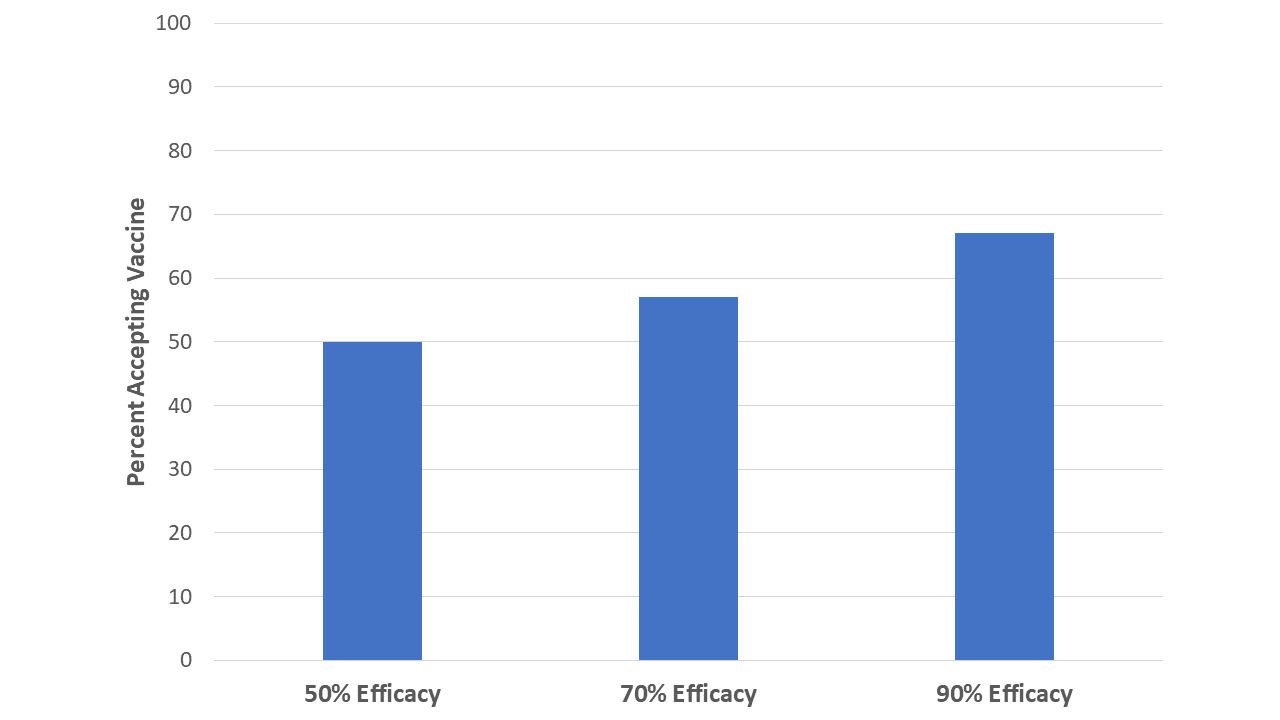A Coronavirus Vaccine is Coming: Will You Get It?
/A new study finds vaccine characteristics as well as personal characteristics drive the choice.
So… are you going to get it? The COVID vaccine, I mean. It has been said many times before, but it bears repeating. The fact that we are even talking about mass vaccination for a disease that was unknown a year ago is mind-blowing. Vaccine development takes decades. But through really unprecedented work here we are.
Of course, the speed that we got here has led to some uncertainty. Recent surveys suggest that somewhere between 50 to 70% of US adults said they will get a COVID vaccine when it is developed.
That may not be enough to squelch the pandemic. The vaunted “herd immunity” threshold for SARS-CoV-2 suggests we’ll need about 70% of the population to be vaccinated, or, you know, become infected naturally. But importantly, characteristics of the vaccine may affect uptake. It turns out this matters a lot, as this study, appearing in JAMA Network Open shows us.
Researchers from Cornell surveyed 2000 adults representative of the US population. They used a powerful technique called conjoint analysis to get their results. The short version, instead of asking them if they would be more or less likely to accept a vaccine given certain conditions, they were presented with two different theoretical vaccine profiles – like this – and had to choose which they would take, or neither.
The elements in the profiles – the effectiveness, the side effect rate, the provenance, the endorsements, were varied randomly. Because of that, they could triangulate how any one factor might move the needle on vaccine acceptance.
Vaccine efficacy
The results were fascinating.
The most important factor? Vaccine efficacy. People were about 20% more likely to accept a 90% effective vaccine compared to a 50% effective vaccine. I’ll note that the FDA has put 50% efficacy as the minimum acceptable threshold for approval of a vaccine candidate.
Major adverse event rate
Next up – side effects. A vaccine with a 1 in a million risk of major side effects was about 10% more likely to be accepted compared to one with 1 in 10,000 risk.
Vaccine provenance
People didn’t like vaccines approved under an emergency use authorization (spoiler alert – any COVID vaccine is very likely to be approved in just this manner) – reducing their willingness by around 5%.
Approval mechanism
Vaccines from the US were most trusted. If the vaccine came from China, the rates of acceptance dropped 15%.
Compared to getting a thumbs up from President Trump, a vaccine endorsed by the CDC or WHO were significantly more likely to be accepted. But the Biden effect was not as strong. Caveat here – I’m not sure why these are mutually exclusive categories. There’s a big difference between a vaccine endorsed by Trump and NOT by the CDC, versus one endorsed by both.
Endorsements
In any case, using this data, we can construct best and worst-case scenarios for when a vaccine actually does come out.
Best case? It’s a 90% effective vaccine with extraordinarily rare side effects, developed in the US that underwent full approval by the FDA and was endorsed by the CDC. About 70% of people would accept such a vaccine.
Worst case? A 50% effective vaccine with an adverse event rate of 1 in 10000, which comes from China, got an EUA from the FDA and was endorsed by President Trump. According to this model, just 12% of people would accept such a vaccine.
I’m, frankly, a bit concerned by these numbers. The best-case scenario would be a literal blockbuster vaccine – it would be a real miracle to see numbers like that - and we’d still be just at 70% uptake. The worst-case scenario is not entirely implausible either, by the way. Remember 50% efficacy is the floor for the FDA to consider an EUA for a vaccine. We may literally be looking at a vaccine like this. And personally, I’d still probably get it – provided the data was vetted by the Vaccine and Related Biological Products Advisory Panel at the FDA. No end-runs around the independent scientists, please.
The study also looked at individual characteristics of the participants to see what factors, all else being equal, were associated with vaccine acceptance. Concerningly given the disproportionate burden in the pandemic, Black people were less accepting of vaccines. So were women, people who were more poorly educated, and those who didn’t personally know a someone with COVID-19.
Overall, this study tells us we have our work cut out for us. Vaccination is our key out of this nightmare. We need to set expectations now, so that uptake remains high even if that eventual vaccine isn’t the blockbuster we’re all hoping for.
A version of this commentary first appeared on medscape.com.








